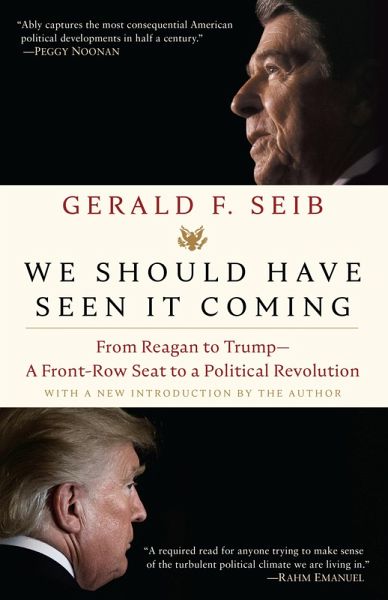
We Should Have Seen It Coming (eBook, ePUB)
From Reagan to Trump--A Front-Row Seat to a Political Revolution
Versandkostenfrei!
Sofort per Download lieferbar
8,95 €
inkl. MwSt.
Weitere Ausgaben:

PAYBACK Punkte
4 °P sammeln!
The executive Washington editor of The Wall Street Journal chronicles the astonishing rise, climax, and decline of the conservative movement, from the election of Ronald Reagan to the Republican Party's takeover by Donald Trump-with a new introduction covering the 2020 election and the future of the GOP "Ably captures the most consequential American political developments in half a century." -Peggy Noonan In 1980, President-Elect Ronald Reagan ushered in conservatism as the most powerful political force in America. For four decades, New Deal liberalism had been the country's dominant motif, cr...
The executive Washington editor of The Wall Street Journal chronicles the astonishing rise, climax, and decline of the conservative movement, from the election of Ronald Reagan to the Republican Party's takeover by Donald Trump-with a new introduction covering the 2020 election and the future of the GOP "Ably captures the most consequential American political developments in half a century." -Peggy Noonan In 1980, President-Elect Ronald Reagan ushered in conservatism as the most powerful political force in America. For four decades, New Deal liberalism had been the country's dominant motif, creating such popular programs as Social Security and Medicare, but it had become creaky in the face of soaring inflation, high unemployment, and a growing sense that the United States was no longer the dominant force on the world stage. Reagan's efforts to reshape the government with tax cuts, deregulation, increased military spending, and a more conservative social policy faltered at first. But the economy roared back, and the Reagan revolution was on. In We Should Have Seen It Coming, veteran journalist Gerald F. Seib shows how this conservative movement came to dominate national politics, then began to evolve into the populist movement that Donald Trump rode to power. Conservative institutions including the Heritage Foundation, the National Rifle Association, Americans for Tax Reform, Rush Limbaugh and Fox News gave the conservative movement a support system, paving the way for Newt Gingrich's Contract with America and George W. Bush's compassionate conservatism. But we also see multiple warning signs, many overlooked or misread, that a populist revolution was brewing. Pat Buchanan, Ross Perot, Sarah Palin, and the Tea Party-all were precursors of the Trump takeover. With behind-the-scenes anecdotes, Seib explains how Trump capitalized on that populist movement to victory in 2016, then began breaking from conservative orthodoxy once in office. He shows how Trump altered Republican relations with the business world, shattered conservative precepts on trade and immigration and challenged America's long-standing alliances. This scintillating work of journalism brings new insight to the most important political story of our time.
Dieser Download kann aus rechtlichen Gründen nur mit Rechnungsadresse in A, B, BG, CZ, D, DK, EW, E, FIN, F, GR, HR, H, I, LT, L, LR, NL, PL, P, R, S, SLO, SK ausgeliefert werden.



